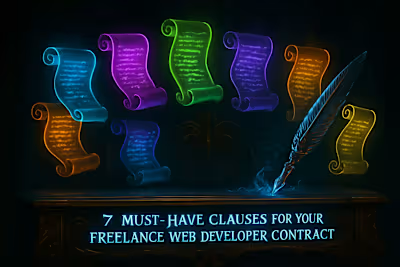Effectively Managing Freelance Web Developers: Tips for Success

Effectively Managing Freelance Web Developers: Tips for Success
Setting the Stage: Onboarding Your Freelance Developer
Clear Project Briefing and Goal Alignment
Providing Access to Necessary Resources
Introduction to Team/Stakeholders (if applicable)
Effective Communication Strategies
Establishing Preferred Communication Channels
Setting Regular Check-in Cadence
Being Responsive and Available
Documenting Key Decisions and Discussions
Project Management Best Practices
Breaking Down Tasks and Setting Milestones
Utilizing Project Management Tools
Proactive Scope Management
Regularly Reviewing Progress
Providing Constructive Feedback
Be Specific and Timely
Focus on the Work, Not the Person
Balance Positive and Negative Feedback
Building a Positive Working Relationship
Trust and Autonomy
Respect Their Time and Schedule
Show Appreciation
Conclusion: Partnering for Project Success
References
Effectively Managing Freelance Web Developers: Tips for Success
Setting the Stage: Onboarding Your Freelance Developer
Clear Project Briefing and Goal Alignment
Providing Access to Necessary Resources
Introduction to Team/Stakeholders (if applicable)
Effective Communication Strategies
Establishing Preferred Communication Channels
Setting Regular Check-in Cadence
Being Responsive and Available
Documenting Key Decisions and Discussions
Project Management Best Practices
Breaking Down Tasks and Setting Milestones
Utilizing Project Management Tools
Proactive Scope Management
Regularly Reviewing Progress
Providing Constructive Feedback
Be Specific and Timely
Focus on the Work, Not the Person
Balance Positive and Negative Feedback
Building a Positive Working Relationship
Trust and Autonomy
Respect Their Time and Schedule
Show Appreciation
Conclusion: Partnering for Project Success
References
Posted Jun 12, 2025
Learn how to manage freelance web developers effectively. Get tips on communication, project management, and fostering a productive remote relationship.










